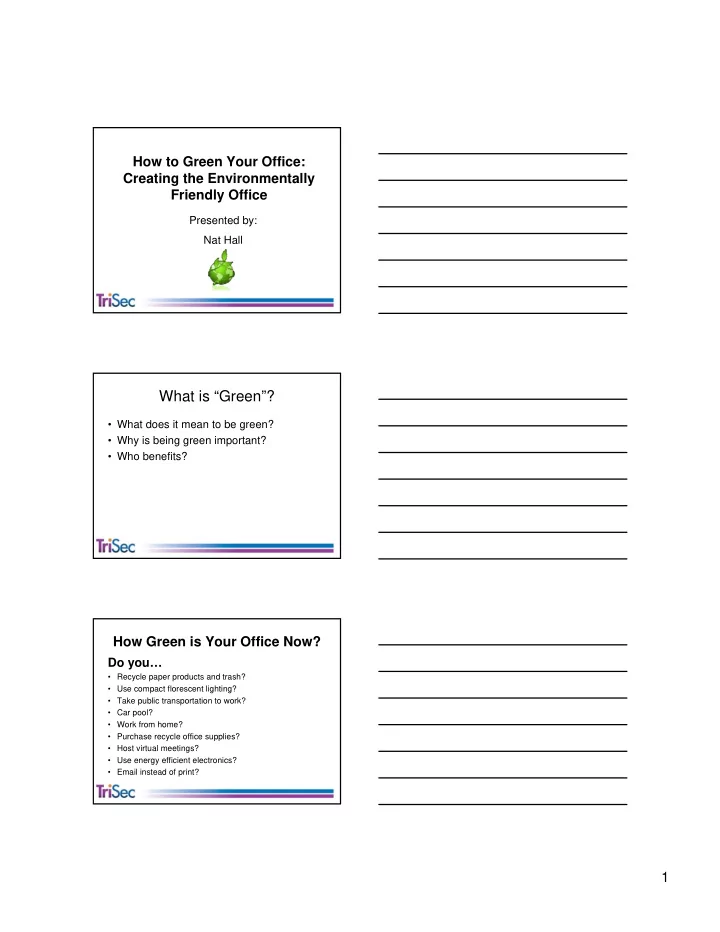

How to Green Your Office: Creating the Environmentally Friendly Office Presented by: Nat Hall What is “Green”? • What does it mean to be green? • Why is being green important? • Who benefits? How Green is Your Office Now? Do you… • Recycle paper products and trash? • Use compact florescent lighting? • Take public transportation to work? • Car pool? • Work from home? • Purchase recycle office supplies? • Host virtual meetings? • Use energy efficient electronics? • Email instead of print? 1
Be Bright About Light • Utilize natural light when possible • Make it a habit to turn off lights • Use energy efficient light bulbs and fixtures • Install timers and motion sensors that shut off lights when not needed Maximize Computer Efficiency • Set your computer to energy-saving settings – Set computer to go to ‘sleep’ when not in use (screen savers do not save energy) • Avoid phantom power – plug hardware into a powerstrip – always turn off when leaving work • Invest in energy-saving computers • Recycle old equipment Benefits of Saving Power • Cost saving • Maximize efficiency of electrical products • Lengthen lifespan of electrical products • Smaller carbon footprint 2
Go Paperless and Digital More electronic work means less paper… • Keep files on computers instead of in file cabinets (be sure to back up files in more than one place!) • Review documents onscreen instead of printing • Replace paper memos with emails • Request to be removed from junk mailing lists Print Smarter • Buy chlorine-free paper with a higher percentage of post-consumer recycled content • Print on both sides of paper • Avoid color printing • Recycle toner and ink cartridges • Reuse boxes for shipping and shredded paper for packing material Recycle, Recycle, Recycle • Recycle almost everything in your office – Fax paper, envelopes, junk mail, paperclips, cell phones, PDA’s, pagers, computers etc.. • Place recycle bins in accessible, high traffic areas • Provide information to co-workers about what can be recycled 3
Benefits of Smarter Paper Use • Cost savings – use less paper, ink and power • Less waste of natural resources (trees, water, and other resources used in the production of paper and ink) • Reduce carbon footprint • Fewer toxins released into the environment Create a Healthy, Non-Toxic Office • Purchase office supplies and furniture made of recycled or sustainably sourced materials • Buy furniture, carpet and paint that is free of volatile organic compounds (VOC’s) • Use non-toxic cleaning products • Brighten up cubicle or office with a plant that absorbs indoor pollution Benefits • Better air quality: lessen potential health problems associated with poor indoor air quality • Release fewer toxins into the environment • Protect finite natural resources (hardwoods) • Reduction of amount of trash going to landfills 4
Lunch Time • Bring your lunch to work in reusable containers, plates, utensils and napkins • Drink tap or filtered water instead of bottled water • Use fair-trade, local and/or organic coffees, teas, snacks • If possible, compost vegetable and fruit scraps and bio-degradable products Benefits • Less non-degradable trash in landfills • Reduce your carbon footprint • Support socially and environmentally responsible agriculture practices • Potential health benefits to eating organically-grown produce • If you have a garden, compost is a great natural fertilizer! Telecommute • Use instant messaging, video conferencing, teleconferencing and take online classes to make working from home a reality • Consider a longer 4-day work week to reduce energy and time spent on commuting to work. • Even working from home one day a week or a couple times a month can have a positive effect 5
Green Your Commute • Organize an office carpool, bike, walk, or take public transportation when possible • Join a car-sharing service • Consider a hybrid or fuel efficient car the next time you are buying a vehicle • Rent hybrid or fuel efficient vehicles when traveling for work Benefits • Smaller carbon footprint • Health benefits associated with walking or biking • Many workers find they are more productive when working from home (fewer interruptions) • Less use of fossil fuels and other non- renewable natural resources Other Actions • Learn more about your carbon footprint – http://www.nature.org/initiatives/climatechang e/calculator/ • Buy carbon off-sets – http://www.nativeenergy.com/ 6
Benefits of a Green Office • Lighter ecological footprint • Healthier environment • Increase productivity • Cost savings in energy and material expenses • Maximize computer and electronics efficiency What’s the Point? • Short-term inconveniences • Long-term benefits – For ourselves – For our families – For our communities – For the world Share your ideas Lead by example…teach your co-workers the value and benefits of an environmentally friendly, green workspace 7
Recommend
More recommend